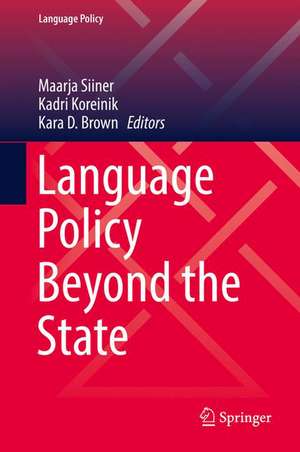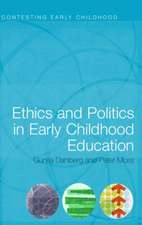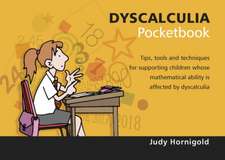Language Policy Beyond the State: Language Policy, cartea 14
Editat de Maarja Siiner, Kadri Koreinik, Kara D. Brownen Limba Engleză Hardback – 12 mai 2017
Language Policy beyond the State invites readers to (re-)consider the ways language policy is constituted, taken up, and researched if we look within and past the state. Contributors to this edited volume draw attention to language policy as always in the making, focusing on agency, on-the-ground practices, and ideologies. The chapters of the book reveal how simultaneous, and at times contradicting, language policies exist within a state and explore the complex roles played by families, businesses, educational institutions, and media in generating and appropriating these policies.
By moving away from language policy analysis concerned primarily with how official state policies address well-defined language problems, some of the contributions of the volume highlight how the problems themselves can be ideological artifacts or are discursively constructed in language ideological debates that are provoked by changes in the geopolitical situation in the region. Using qualitative and descriptive research, the book uses Estonia as a setting to examine the ways historic and contemporary populations navigate language policies in both local and transnational spaces. As a whole, the collection speaks eloquently and powerfully to current efforts to understand and map the ways multiple institutions and individuals—not just the state—play an active role in forming and taking up language policies.
| Toate formatele și edițiile | Preț | Express |
|---|---|---|
| Paperback (1) | 779.39 lei 6-8 săpt. | |
| Springer International Publishing – 8 aug 2018 | 779.39 lei 6-8 săpt. | |
| Hardback (1) | 785.42 lei 6-8 săpt. | |
| Springer International Publishing – 12 mai 2017 | 785.42 lei 6-8 săpt. |
Din seria Language Policy
- 24%
 Preț: 804.41 lei
Preț: 804.41 lei - 18%
 Preț: 885.63 lei
Preț: 885.63 lei - 18%
 Preț: 1009.08 lei
Preț: 1009.08 lei - 24%
 Preț: 776.31 lei
Preț: 776.31 lei - 18%
 Preț: 775.30 lei
Preț: 775.30 lei - 15%
 Preț: 641.71 lei
Preț: 641.71 lei - 15%
 Preț: 634.32 lei
Preț: 634.32 lei - 18%
 Preț: 740.25 lei
Preț: 740.25 lei - 15%
 Preț: 643.16 lei
Preț: 643.16 lei - 15%
 Preț: 642.68 lei
Preț: 642.68 lei - 18%
 Preț: 1118.75 lei
Preț: 1118.75 lei - 24%
 Preț: 753.11 lei
Preț: 753.11 lei - 15%
 Preț: 647.40 lei
Preț: 647.40 lei - 18%
 Preț: 949.23 lei
Preț: 949.23 lei - 18%
 Preț: 895.58 lei
Preț: 895.58 lei - 15%
 Preț: 645.47 lei
Preț: 645.47 lei - 24%
 Preț: 689.39 lei
Preț: 689.39 lei - 15%
 Preț: 642.83 lei
Preț: 642.83 lei - 15%
 Preț: 648.89 lei
Preț: 648.89 lei - 15%
 Preț: 635.80 lei
Preț: 635.80 lei - 15%
 Preț: 634.32 lei
Preț: 634.32 lei -
 Preț: 389.70 lei
Preț: 389.70 lei - 18%
 Preț: 1106.79 lei
Preț: 1106.79 lei - 24%
 Preț: 787.79 lei
Preț: 787.79 lei - 18%
 Preț: 1111.97 lei
Preț: 1111.97 lei - 24%
 Preț: 738.97 lei
Preț: 738.97 lei - 15%
 Preț: 700.29 lei
Preț: 700.29 lei - 18%
 Preț: 895.27 lei
Preț: 895.27 lei - 18%
 Preț: 889.60 lei
Preț: 889.60 lei - 18%
 Preț: 953.97 lei
Preț: 953.97 lei
Preț: 785.42 lei
Preț vechi: 957.83 lei
-18% Nou
Puncte Express: 1178
Preț estimativ în valută:
150.34€ • 163.36$ • 126.37£
150.34€ • 163.36$ • 126.37£
Carte tipărită la comandă
Livrare economică 21 aprilie-05 mai
Preluare comenzi: 021 569.72.76
Specificații
ISBN-13: 9783319529912
ISBN-10: 3319529919
Pagini: 439
Ilustrații: XII, 245 p. 18 illus.
Dimensiuni: 155 x 235 x 16 mm
Greutate: 0.54 kg
Ediția:1st ed. 2017
Editura: Springer International Publishing
Colecția Springer
Seria Language Policy
Locul publicării:Cham, Switzerland
ISBN-10: 3319529919
Pagini: 439
Ilustrații: XII, 245 p. 18 illus.
Dimensiuni: 155 x 235 x 16 mm
Greutate: 0.54 kg
Ediția:1st ed. 2017
Editura: Springer International Publishing
Colecția Springer
Seria Language Policy
Locul publicării:Cham, Switzerland
Cuprins
Introduction: Questioning Borders by Kara D. Brown, Kadri Koreinik and Maarja Siiner.- Part I Spatial Reconsiderations: State Decentered by Migration and Globalization.- Priming Language Political Issues as Issues of State Security. A Corpus-assisted Discourse Analysis of Language Ideological Debates in Estonian Media before and after the Ukrainian Crisis by Maarja Siiner and Svetlana L’nyavskiy-Ekelund.- Doing Language Policy: Teasing out the Tensions for Transnational Scholars in Estonian and Danish Higher Education by Josep Soler-Carbonell and Merike Jürna.- Swedishization or Internationalization? Negotiating the Common Language and Culture in a Swedish-Baltic Financial Institution….. by Maarja Siiner.- Emerging Language Political Agency among Estonian Native by Speakers in Finland by Kadri Koreinik and Kristiina Praakli.- Parental Attitudes and Family Conversational Strategies Shaping the Family Language Policies of two Estonian-Finnish Families by Kristiina Teiss and Sirje Perendi.- Young Swedish-Estonian Returnees to Estonia: Reflections on Family Language Policy and a Multilingual Upbringing by Anna Verschik and Colm Doyle.- Part II Temporal Reconsiderations: State Decentered by Enduring Connections and new Patterns.- Negotiating a place for German in Estonia: Contemporary Functions, Attitudes and Policies by Heiko F. Marten.- From Literary Languages to Dialectal Varieties to Microlanguages? Historical Perspectives on Language Policy towards South Estonian and Latgalian by Catherine Gibson.- Policy drag & resiliency: Teachers’ Response to Voluntary Language Policy in South Eastern Estonia by Kara D. Brown.- Official Language Policy as a Factor in using Receptive Multi-lingualism among Members of an Estonian and a Finnish Student Organization by Hanna-Ilona Härmävaara.- Language as an Object of National Passion: Reflections from Estonia by Emilia Pawłusz.- Epilogue by Lenore Grenoble.
Notă biografică
Maarja Siiner, Ph.D., is a research affiliate at the University of Oslo, Center for Multilingualism in Society across the Lifespan, where she studied discourses on dementia and immigrants in the project Language and Communication in Multilingual Speakers with Dementia in Norway. She has previously served as a postdoctoral research fellow at the University of Copenhagen, Centre for Internationalization and Parallel Language Use, studying institutional responses to internationalization at the University of Copenhagen. Her previous research includes studies of language management in Swedish multinational companies operating in Estonia, carried out at Lund University and cross-country comparisons of the interrelatedness of language policy developments and the democratization and decentralization processes in Scandinavia and Baltics.
Textul de pe ultima copertă
Language Policy beyond the State invites readers to (re-)consider the ways language policy is constituted, taken up, and researched if we look within and past the state. Contributors to this edited volume draw attention to language policy as always in the making, focusing on agency, on-the-ground practices, and ideologies. The chapters of the book reveal how simultaneous, and at times contradicting, language policies exist within a state and explore the complex roles played by families, businesses, educational institutions, and media in generating and appropriating these policies.
By moving away from language policy analysis concerned primarily with how official state policies address well-defined language problems, some of the contributions of the volume highlight how the problems themselves can be ideological artifacts or are discursively constructed in language ideological debates that are provoked by changes in the geopolitical situation in the region. Using qualitative and descriptive research, the book uses Estonia as a setting to examine the ways historic and contemporary populations navigate language policies in both local and transnational spaces. As a whole, the collection speaks eloquently and powerfully to current efforts to understand and map the ways multiple institutions and individuals—not just the state—play an active role in forming and taking up language policies.
Caracteristici
An up-to-date analysis of language policy as a multilayered process, both within and beyond the state An overview of research methods that highlight the complexity of language policy research Current and rigorous research brings an international perspective to the investigation and analysis of language policy in Estonia and beyond













